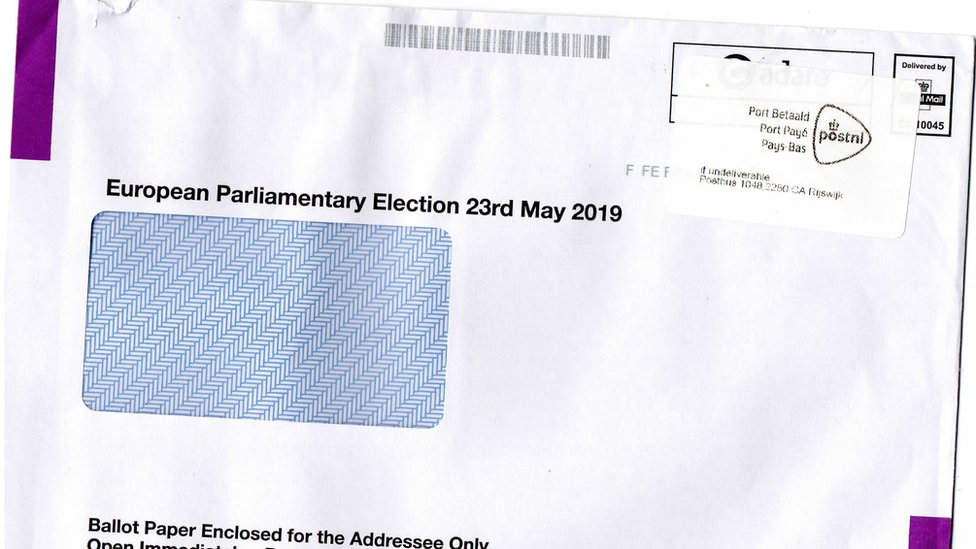 Image copyright
Image copyright
Joy Elise Allen
The postal mark on some envelopes shows they were sent to France via the Netherlands
The BBC has been contacted by British expats from across the world who say their postal voting forms have arrived late, or not at all.
The BBC found some local councils used a postal service called Adare SEC, rather than Royal Mail, to send them.
Envelopes seen by the BBC indicate they were sent via the Netherlands.
Voters must have their papers back in the UK by election day. Adare SEC said all ballots were posted “in line with the election and council timetables”.
The company insisted they had used “reputable mail handlers” whose job it was to “assess the best route through other European countries before the mail arrives at the final destination”.
The UK will go to the polls on Thursday, between 07:00 BST and 22:00 BST.
Voters from Belgium, Cyprus, Denmark, France, Hong Kong, Italy, Poland, Sweden, Switzerland, Ukraine and United States have contacted the BBC to say their postal votes have either arrived too late or not arrived at all.
Expat voters who want to participate in European elections can register in advance to have a postal vote in the British constituency where they or their parents were last registered to vote.
But they must have their completed ballot paper returned to the local electoral returning officer by the time polls close on election day.
It is believed, based on the number of eligible voters, that thousands of Britons living in France could be affected.
Ann Bone, who lives in Maury in the Pyrenees Orientales, said her postal vote did not arrive until Friday – and when she went to return it to Calderdale Council she was informed by the French postal service that it had “no chance” of arriving in the UK in time.
Her husband’s ballot has still not arrived in France. She said: “We’ve been denied a vote, basically.”
‘Very angry’
Joy Elise Allen was told by Barnsley Council her postal vote was sent to her at the end of April – 16 days later it arrived at her home in Saint-Pierre-d’Exideuil in France having being sent via the Netherlands.
“I know of someone who’s flown back to the UK with his whole family’s emergency proxy votes,” said Ms Allen.
“We are all very upset, very angry and we want someone to be held accountable for this.”
A spokeswoman for the council said it was “investigating this and have asked for a response from our postal provider”.
‘I feel cheated’
Adam Kaznowski who lives in Poland says his postal vote only arrived on Tuesday, meaning there is not enough time to return his vote to the UK.
“I’m not going to send in my postal vote,” he said “there is absolutely no point.”
“This is an issue of my fundamental rights being breached – in theory I have the right to vote but in practice it is not possible.”
“The postal vote system is not fit for purpose – it is dependant on third parties which the UK government has no control over.”
Stuart Stone – a chef living in Malmo, Sweden – described the situation as “a travesty”.
“It is my right to vote and it is really important,” he said.
“I feel cheated.”
The Electoral Commission said it has had “no involvement” in the distribution of postal votes for the European election – adding that responsibility lay with local councils.
A spokesman for the commission advised anyone overseas who has yet to receive their postal vote to contact the relevant council.
European elections: What are the rules for overseas voters?
UK citizens living abroad are able to vote either by postal vote or by proxy, when a registered person votes in the UK on their behalf.
Only three other EU countries allow citizens living abroad to vote using a proxy – the Netherlands, France and Belgium.
However, unlike 21 EU nations, the UK does not allow its nationals to vote in its overseas embassies and consulates.
Bulgaria, Greece and Italy only allow overseas citizens to vote if they are living in another EU country.
The Czech Republic, Ireland, Malta and Slovakia do not allow their citizens to vote in their home constituencies from abroad.
Estonia allows overseas voters to vote online, the only EU country to do so.
Source: European Parliamentary Research Service
The government had hoped a Brexit deal would be agreed prior to these elections, and Prime Minister Theresa May said the UK would not have to take part if MPs agreed a plan first.
But that has not come to pass and the UK will definitely take part in the elections, returning 73 Members of the European Parliament (MEPs) to Brussels and Strasbourg.
While the UK and Netherlands vote on Thursday, voting in other EU nations will take place at varying times over the following three days, with the whole process completed by 22:00 BST on Sunday 26 May.














